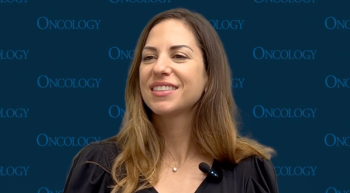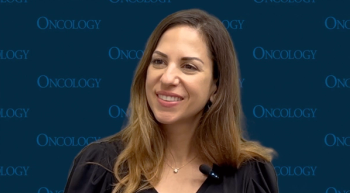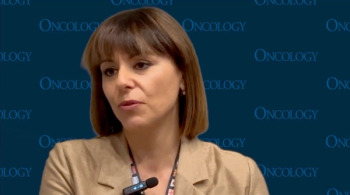
Oncology NEWS International
- Oncology NEWS International Vol 7 No 4
- Volume 7
- Issue 4
CALGB Psycho-Oncology Committee Focuses on QOL
PARIS--The development of valid, reliable yardsticks for measuring quality of life (QOL) is now making it possible for clinicians to advise patients about what they can realistically expect from a particular treatment, Jimmie Holland, MD, of Memorial Sloan-Kettering Cancer Center, said at the Eighth International Congress on Anti-Cancer Treatment (ICACT).
PARIS--The development of valid, reliable yardsticks for measuring quality of life (QOL) is now making it possible for clinicians to advise patients about what they can realistically expect from a particular treatment, Jimmie Holland, MD, of Memorial Sloan-Kettering Cancer Center, said at the Eighth International Congress on Anti-Cancer Treatment (ICACT).
Dr. Holland chairs the CALGB Psycho-Oncology Committee. CALGB was one of the first cooperative groups to collect QOL and psychosocial data in the context of large, multicenter oncology trials.
"Its not some esoteric hocus-pocus," Dr. Holland said. Rather, she noted, health-related QOL very specifically refers to how the disease and its treatment are influencing the patients physical, psychological, social, sexual, and occupational functioning.
The CALGB Psycho-Oncology Committee has the dual mission of studying the impact of treatments on QOL and developing interventions that reduce stress. Since its inception in 1976, the Committee has developed a network of eight psycho-oncology research centers, each of which has principal investigators committed to QOL studies.
Dr. Holland said that the Committees use of centralized, trained telephone interviewers to collect information from patients improves the completeness and quality of the data, removes the burden of data collection from the clinical staff, and is cost effective.
Reviewing the latest scientific accomplishments of the Psycho-Oncology Committee, Dr. Holland described a recent study comparing the investigational agent azacytidine with observation in patients with myelodysplastic syndrome.
Here, QOL evaluations uncovered important advantages for active treatment: Patients who received azacytidine experienced significantly less fatigue and dyspnea, better physical functioning, more positive affect, and better overall QOL than those assigned to observation.
"So all of the parameters that we were measuring pointed in the same direction--that patients are indeed functioning better when they take this drug," Dr. Holland said. Complete data on the study will be presented at the upcoming ASCO annual meeting in Los Angeles.
In another CALGB trial, which found that the addition of hydrazine to chemotherapy in patients with advanced lung cancer does not prolong survival relative to placebo, the Psycho-Oncology Committee contributed crucial evidence that this ineffective drug also worsens overall physical functioning.
The Committee has also been able to prove that prophylactic cranial radiation in patients with advanced lung cancer worsens cognitive function, thereby challenging the claim that prophylactic doses take no toll on mental status.
Dr. Holland and her colleagues have used the CALGBs large registry of cancer survivors to conduct long-term follow-up studies of adult leukemia and Hodgkins disease survivors.
"We found that the Hodgkins survivors had almost double the mean level of distress as the leukemia survivors," she reported. "We think that this is because patients with Hodgkins disease know that they can relapse, have fertility problems, have more risk of second malignancies, and tend to suffer more from conditioned nausea."
Another issue tackled by the Psycho-Oncology Committee is whether bereavement predicts recurrence or shorter survival in women with breast cancer. "This is a question that can only be asked in the context of standardized therapy," Dr. Holland said.
The Committees case-control study of 232 women who had participated in a CALGB trial of adjuvant therapy found no difference in recurrence rate or survival duration among women who had experienced the death of a spouse or child after entry into the trial. "So we can reassure women that, if theyve had a major loss, it does not mean it puts them at risk for their tumor coming back," she said.
The Committees findings have also refuted the myth that psychological state at the start of treatment predicts survival in women with breast cancer.
The Psycho-Oncology Committee is likewise planning to apply QOL measurements in an ongoing randomized CALGB comparison of surgery versus surgery, radiation, and chemotherapy in patients with esophageal cancer. The aim is to examine the trade-off between the projected increase in 5-year survival and the additional cost and possible diminution in quality of life with use of trimodality therapy.
The Committee will also be expanding its scope of activities into the area of patient-physician communication. "The new PDR (patient-doctor relations) program will be dealing with the fact that oncologists are always having to give bad news," Dr. Holland said. "Communication is a critical issue with every cancer patient, whatever their treatment, and at every stage of illness," she emphasized.
A phase II study will be testing the efficacy of training sessions in improving the ability of medical oncology fellows to convey information to patients.
Articles in this issue
almost 28 years ago
New NCCN Outcomes Data Base Sparks Great Interestalmost 28 years ago
ODAC Recommends Approval of Two New Taxol Indicationsalmost 28 years ago
Research into Neuropathic Pain Yields Potential Therapiesalmost 28 years ago
Vice President Gore Is Featured In Antismoking Radio Spotsalmost 28 years ago
Genetically Modified Dendritic Cells Enhance Immune Responsealmost 28 years ago
Research Sets Stage for Possible Autoimmune Therapyalmost 28 years ago
Proposed Stark II Regulations Spell Trouble for Oncology Carealmost 28 years ago
Optimal Salvage Therapy for Ovarian Cancer Focus of ICACTalmost 28 years ago
Ten-Year Study of Survival Rates for Ovarian Canceralmost 28 years ago
Virtual Colonoscopy a ‘Kinder, Gentler’ Colon ExamNewsletter
Stay up to date on recent advances in the multidisciplinary approach to cancer.



































